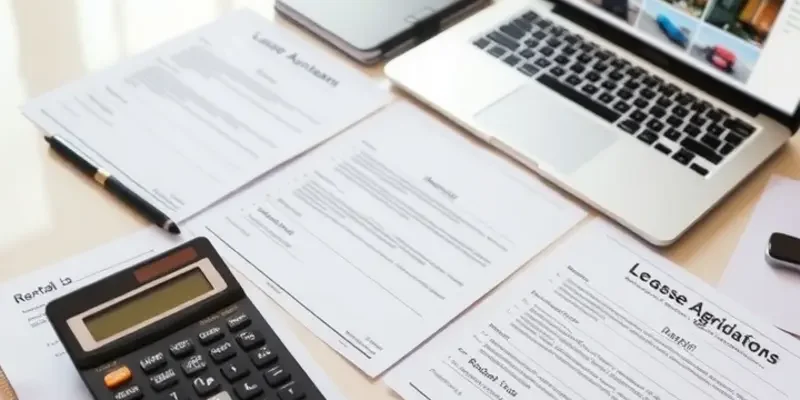Navigating the rental market can feel overwhelming, especially for young professionals, first-time renters, and families looking to secure a comfortable home. A clear understanding of rental fee breakdowns can ease anxiety and empower you to make informed decisions. From base rent to additional costs like utilities and application fees, each aspect of your rental agreement can significantly affect your monthly budget. This guide will demystify these elements, giving you the insights needed to comprehend not just your lease agreement, but how to negotiate better terms. Emphasizing clarity, practicality, and financial responsibility, this comprehensive breakdown addresses the unique needs of students, couples, and families alike. By the end, you’ll have the tools to approach your next rental situation with confidence, ensuring you understand not just what you’re paying, but why. Let’s dive into the essential components of rental fees so you can secure the best deal for your situation.
Understanding the Core Components of Rent

When stepping into the world of renting, it’s essential to grasp the costs that will shape your monthly spend. The journey begins with the base rent, which is the fundamental charge for your living space. Think of it as the canvas on which additional fees and costs are painted. Understanding your rental fee requires exploring various components and discerning what they mean for your financial planning.
Beyond the base rent, utilities often constitute a significant portion of your monthly expenses. Depending on your lease agreement, utilities like water, electricity, gas, and internet might be included in the rent or charged separately. Carefully review your lease for any included utilities and prepare for the possible variability in these bills month-to-month.
Additional fees can creep up and catch new renters by surprise. Common fees include application fees, which cover the cost of processing your rental application and conducting background checks. These are generally non-refundable, so choose wisely when applying.
The next notable component is the security deposit, typically equivalent to one month’s rent. This ensures the landlord against damages beyond normal wear and tear, and if all is well upon move-out, it’s refundable. Some places might offer a non-refundable upfront fee in lieu of a traditional security deposit, often marketed as insurance or a ‘bond’. Again, verify the lease for specific stipulations.
If you’re bringing a furry friend, be ready for pet fees or deposits, which vary widely. Landlords may charge either a one-time fee or a monthly pet rent. This could also involve an additional deposit meant to cover potential damages caused by your pet.
When parsing through lease agreements, watch out for terms on maintenance fees or shared facility costs. Some properties charge for community amenities—like pools, gyms, or parking spaces—even if you don’t plan to use them.
A crafty way to mitigate unexpected charges is by having a robust understanding of all lease terms and fees. Before signing, propose scenarios to the landlord, like what happens if you need to terminate the lease prematurely, to grasp potential repercussions.
Budgeting for rent isn’t just about covering the monthly check. Factor in all related expenses to avoid financial strain. To articulate a well-informed financial plan, consider visiting resources such as financial planning for renters which offer insights on housing budgeting strategies.
Lastly, some landlords may offer discounts if rent is paid early or penalties for late payments. Verify these details in the lease agreement to foresee any advantage or detriment in your monthly cash flow. Informed understanding allows you to navigate rental choices with confidence, securing a space that meets your needs without unwelcome financial surprises.
Hidden Costs and Negotiation Tips

When diving into the world of renting, it’s easy to focus on the monthly rent while overlooking hidden costs that can strain your budget. Awareness is key to navigating these financial traps. Common hidden fees include maintenance costs, parking charges, and utilities that might not be included in the rent.
Start by inquiring about maintenance responsibilities. Some landlords handle all repairs, while others might require you to handle small fixes. If you’re responsible for certain repairs, consider the potential costs. Parking is another aspect to investigate. Some properties charge extra for parking spaces, especially in urban areas where parking is a premium. Ask if there are any associated fees, as these can vary significantly.
Understanding utility costs is crucial. While some rentals include utilities like water, gas, or electricity, others do not. Request a breakdown of monthly utility expenses if they aren’t included, as these can fluctuate based on location and season. Additionally, see whether there are future plans to introduce new fees or increases.
Now, onto lease negotiation. Approach it with preparation and a clear strategy. Research comparable rentals in your desired area to understand market rates. This knowledge will support your bargaining position. Use local rental guides, such as renting in Charleston, SC, to understand regional pricing trends and amenities provided.
When negotiating, prioritize what matters most to you. Whether it’s the rent amount, included amenities, or lease duration, having negotiable and non-negotiable items will guide discussions. Be polite yet firm, and don’t hesitate to ask for concessions on less obvious aspects, such as waived application fees or improved amenities.
Common pitfalls include signing a lease without clarifying terms or neglecting to document verbal agreements. Always request written confirmation of any negotiated terms to avoid future disputes. If there’s an option for early termination, understand the conditions clearly. This knowledge could save substantial hassle later.
Questions to ask include: “What exactly does the rent cover?” “Are there non-refundable fees?” and “What’s the process for requesting repairs?” These inquiries help clarify expectations and prevent misconceptions.
Lastly, don’t underestimate the power of peer comparisons. Speak to current tenants about their experiences, or read online reviews to gather insights. Their feedback can highlight hidden issues and potential red flags.
Equipped with these strategies, you’ll be better prepared to recognize hidden costs and engage in effective negotiations, ensuring your rental journey is both informed and favorable.
Final words
Gaining a thorough understanding of rental fees can be the cornerstone of a positive renting experience. By breaking down the components of your rental agreement and being aware of potential hidden costs, you empower yourself to make decisions that align with your financial goals. Remember that every detail counts, from the base rent to those unexpected charges that can sneak up on you. With the insights shared in this guide, you can confidently navigate your next leasing journey. Your home should not only be a space you live in but also a place that reflects your financial wisdom and lifestyle choices. Take this newfound knowledge, embrace it, and ensure your rental experience is as clear and beneficial as possible.









